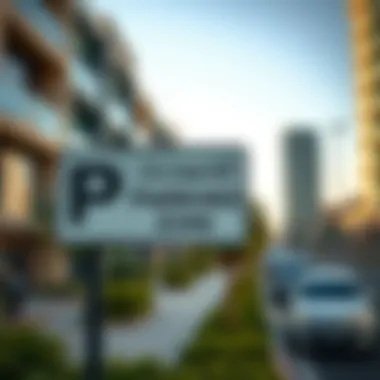Guide to Mawaqif Resident Parking in Dubai


Intro
Navigating urban landscapes can be a hefty challenge, especially in a bustling metropolis like Dubai. Among the many facets of urban life, parking stands out as a significant concern for residents. Here, the Mawaqif resident parking zones come into play, offering designated spaces for residents to park their vehicles. However, it's far more than merely finding a spot to leave your car; understanding the intricacies of these zones can greatly impact the daily lives of residents and urban planners alike. This guide dives into everything you need to know about Mawaqif resident parking zones, from their locations and regulations to their influence on the broader real estate market.
With Dubai's rapid growth, the importance of understanding parking regulations can't be overstated. Mawaqif is not just a parking management system; it's a reflection of how urban planning seeks to accommodate the ever-growing population. This exploration provides valuable insights to homeowners, expatriates, real estate professionals, and analysts who seek a deeper understanding of how these parking zones fit into the larger urban narrative and market trends.
Whether you're a long-term resident or just considering a move to this dynamic city, grasping the understanding of Mawaqif’s structures will help you navigate Dubai's urban fabric with greater ease.
Understanding Mawaqif Parking System
The Mawaqif parking system stands as a crucial part of urban infrastructure in Dubai. It plays a pivotal role not only in managing parking spaces efficiently but also in shaping the overall experience of residents and visitors alike. Understanding this system is essential for anyone navigating the bustling thoroughfares of Dubai, particularly for residents who have to contend with the sometimes daunting task of finding available parking.
The main aim of the Mawaqif parking zones is to organize parking in a city that is growing rapidly. This orderly management assists in reducing congestion and providing ease of access to various amenities across the city. Moreover, it ensures vehicles are parked correctly and safely, helping protect the urban environment from chaos.
Definition and Purpose
At its core, the Mawaqif parking system is designed to regulate parking in designated areas across Dubai. Essentially, Mawaqif means "parking" in Arabic, making the system's name quite reflective of its purpose. The creation of these parking zones aims to create a balance: on one hand, providing residents convenient access to parking spaces, and on the other, it helps to free up streets for the flow of traffic and public transport.
Mawaqif employs a straightforward approach to parking management. It requires residents to obtain parking permits for designated zones, which in turn allows for a systematic allocation of available parking spaces. This proves beneficial in densely populated areas where competition for parking spots can be intense.
Historical Context
The development of the Mawaqif parking system reflects Dubai's broader urban evolution. With a steady increase in population and the influx of expatriates, the demand for parking soared. This challenge prompted local authorities to take action, leading to the establishment of Mawaqif in 2008.
Initially, the system focused on a handful of areas, targeting the busiest parts of the city. Over the years, it has expanded significantly, now covering a wide spectrum of neighborhoods and sectors. The innovation behind Mawaqif aligns with Dubai's vision of becoming a fantastic global city, ensuring residents and visitors can comfortably share the roads without fearing for their vehicles' safety or their parking options.
"Mawaqif serves not only as a parking solution but as an integral part of Dubai's overall urban planning strategy."
In summary, grasping the Mawaqif parking system shed light on its importance in maintaining order in Dubai's fast-paced life. It is both a solution to a growing city's needs and a testament to its planning and foresight.
Overview of Resident Parking Zones
The Mawaqif resident parking zones provide an organized approach to managing parking space in Dubai, addressing a pressing issue for both residents and visitors. These designated parking areas are pivotal for urban planning efforts aimed at ensuring vehicular orderliness while also enhancing the living experience for those who call this city home. Understanding the characteristics and significance of these zones can make a sizable difference in navigating day-to-day logistics, especially in densely populated districts.
Criteria for Resident Zones
Several criteria determine the establishment of resident parking zones within the Mawaqif system. Primarily, these zones are set up based on the density of residential populations and the availability of parking spaces. Key factors include the following:
- Residential Density: Areas with high numbers of residential buildings often require stricter parking regulations. The need to manage space effectively becomes paramount as more vehicles clamor for limited spots.
- Accessibility to Public Transport: Proximity to metro stations and bus stops can influence the allocation of parking resources. Zones near transit hubs may see different regulations, encouraging the use of public transportation.
- Local Demand and Complaints: Feedback from community members plays a critical role in defining and refining parking zones. If a neighborhood experiences chronic parking shortages, it becomes a candidate for the introduction or expansion of Mawaqif resident parking.
These criteria collectively shape a system that aims to be fair and efficient, catering to the dynamic living arrangements in Dubai.
Geographic Distribution
The geographical distribution of Mawaqif resident parking zones is strategic and aimed at balancing access and utilization across the city. These zones are spread widely but, unsurprisingly, are more concentrated in locations where residential density is highest.
Specific Areas of Interest:
- Downtown Dubai: This area, teeming with skyscrapers and luxury apartments, has several parking zones to cater to the substantial number of residents and visitors alike.
- Jumeirah: Known for its vibrant community and affluent housing estates, Jumeirah features extensive resident parking, reflecting its family-oriented demographic.
- Dubai Marina: A popular locale for expatriates, this area has seen rapid development. Mawaqif parking zones here help manage the influx of residents and visitors, ensuring adequate parking availability.
- Deira and Bur Dubai: These historic districts have both residential and commercial spaces, showcasing parking zones designed to support their mixed-use nature.
The distribution is not random; it aims to prioritize convenience for residents while also alleviating pressure on bustling urban centers. Each area offers a unique blend of parking solutions tailored to its specific community needs.
Interactive Mawaqif Parking Zones Map
The Interactive Mawaqif Parking Zones Map serves as an indispensable tool for both current and prospective residents navigating the often complex parking landscape in Dubai. It provides a clear, visual representation of parking zones, which is essential for efficient urban living. The ability to see real-time parking availability and zone designations can greatly streamline the process of finding a parking spot in a city that is bustling with both residents and visitors.
Moreover, this map highlights the specific areas designated for residents, which can save significant time and hassle. With the ever-increasing number of vehicles on Dubai's roads, utilizing this map can mitigate frustrations commonly associated with urban parking, making it an essential resource for anyone looking to move about the city effectively.


Accessing the Map
Accessing the Mawaqif Parking Zones Map is straightforward. Users can visit the official Mawaqif website or download the Mawaqif mobile app from either the Apple App Store or Google Play Store. These platforms ensure that residents have immediate access to up-to-date information, helping them make informed parking choices.
Once you have the app or are on the website, users can interact with the map to filter options based on their location. This means you can pinpoint which areas are closer to your home or workplace, optimizing your time and effort. Additionally, the interactive nature of the map allows users to zoom in on specific streets, further enhancing the detail available.
Understanding the Map Legend
Navigating the Mawaqif map effectively requires understanding its legend. The map legend is much more than just a guide; it deciphers the colors and symbols used, indicating various parking zones and their respective rules. For instance, different colors represent various types of parking zones—some may be specifically for residents, while others cater to visitors.
Being familiar with the legend is crucial because it helps prevent unintentional violations, which could result in fines. For instance, a light blue zone may indicate short-term parking, whereas a dark green zone might be permanently allocated for residents only. Such distinctions are essential to avoid the pitfalls of parking in the wrong area, ultimately maintaining harmony within the community.
"Understanding the map is like reading the local street signs; it’s essential to stay on the right track and avoid unnecessary penalties."
Parking Regulations and Policies
Understanding the parking regulations and policies within Dubai’s Mawaqif resident zones is crucial for anyone living or planning to invest in the area. These regulations not only govern parking behavior but also dictate how residents interact with urban infrastructure. Essentially, they create a framework designed to enhance accessibility, ensure fairness, and mitigate congestion in one of the world's busiest cities. The policies are well-defined and play a pivotal role in maintaining order and civility in public spaces.
Permit Requirements
To park in specified Mawaqif zones, residents must obtain a parking permit. This permit serves as proof of authorization for parking in these dedicated spaces. The process involves several steps:
- Eligibility Check: Generally, only residents who live in eligible buildings in proximity to a designated zone can apply.
- Application Submission: The application can be submitted online through the RTA website or in physical offices. Required documents often include proof of residency and vehicle registration.
- Permit Issuance: Upon approval, the permit can be printed at home or collected from the office.
For those who may miss the petty details, it’s wise to read the official regulations carefully. The penalties for parking without a valid permit can be steep, so knowing the rules like the back of one’s hand can save a headache.
Enforcement Mechanisms
The enforcement of parking rules is a critical component that ensures compliance and discourages violations. Dubai employs a multi-faceted approach to monitoring parking in Mawaqif zones:
- Automated Systems: License plate recognition technology is widely utilized, enabling swift identification of vehicles without permits. This is a key part of how enforcement operates efficiently.
- Parking Patrols: Physical patrols by designated officials regularly scan the streets, adding another layer of oversight. Their presence alone can deter violation.
- Public Reporting: Residents are encouraged to report unauthorized parking through mobile applications. By fostering community involvement, residents feel more empowered to maintain order in their neighborhoods.
Fines and Violations
Failing to comply with Mawaqif regulations can lead to various penalties, ranging from standard fines to more severe consequences for repeated offenses. Here’s how it typically breaks down:
- Standard Fines: The fines for parking without a permit usually range from AED 150 to AED 500, depending on the location and violation severity.
- Repeated Offenses: For habitual offenders, additional penalties or the risk of towing may be enacted. This serves as a strong warning against neglecting parking responsibilities.
- Temporary Measures During Peak Times: In certain cases, especially during events or peak hours, stricter measures may be applied, including increased monitoring and fines to manage traffic flow.
"Understanding parking regulations not only benefits individual residents but also contributes to the overall functionality and aesthetic of Dubai's urban landscape."
Benefits of Mawaqif Resident Parking
Mawaqif resident parking zones encompass many advantages that significantly enhance urban life in Dubai. These benefits stretch beyond just providing a parking spot. They communicate a vision for better urban management and community living. Understanding the benefits of Mawaqif resident parking is essential for anyone living in or considering a residence in Dubai.
Enhanced Accessibility
One major advantage of Mawaqif parking is improved accessibility for residents. By designating specific zones for residents, Mawaqif ensures that these individuals have reliable access to parking spaces near their homes. This alleviates the constant worry of finding a spot in an overcrowded city.
Residents can easily park close to their homes, making everyday activities less cumbersome. Whether it's running errands, commuting to work, or inviting friends over, knowing a parking space is available gives a level of comfort missing in many urban areas.
- Convenience: Quick drop-offs and pick-ups become far simpler.
- Safety: Reduces the chances of car damage or theft since resident zones are typically monitored more closely.
- Community Cohesion: With less competition for parking, neighbors might interact more, building a stronger sense of community.
The zoning promotes a lifestyle where residents can enjoy ease of access without the frustration of hunting down a space, a common woe for many in Dubai's bustling urban landscape.
Reduction of Traffic Congestion
Another vital benefit of the Mawaqif resident parking system is its role in curtailing traffic congestion. In a city like Dubai, where population density keeps rising, managing how and where vehicles park is crucial for maintaining smoother traffic flows.


The implementation of designated resident parking zones can substantially cut down on the street congestion often seen in areas without regulations. When residents park efficiently and conveniently, less time is spent driving in circles looking for a spot. This translates to several positive outcomes:
- Faster Response Times for Emergency Services: When roads are not overcrowded with parked cars, it’s easier for ambulances and fire trucks to navigate.
- Cleaner Air: With fewer cars idling and circling in search of parking, there's a reduction in emissions.
- Encouraging Other Transport Means: Mawaqif can promote alternatives like cycling and public transport when residents feel secure about parking arrangements.
"Well-managed parking zones are more than just spaces; they're a strategy for sustainable city living."
Challenges Faced by Residents
The Mawaqif resident parking system in Dubai, while designed to provide structured parking solutions, also presents a series of challenges that residents must navigate. Addressing these challenges not only is crucial for individual residents but also plays a significant role in shaping the overall satisfaction with urban living in a sprawling metropolis like Dubai. These challenges can affect daily routines, add financial burdens, and impact real estate prospects in different neighborhoods. Understanding these elements will give residents a clearer picture of what to expect and how to adapt for a smoother experience.
Limited Availability
One of the most pressing concerns for residents utilizing the Mawaqif resident parking system is the limited availability of parking spaces. Many areas, particularly those with high population density and commercial activity, often struggle to meet the parking demands of local residents.
Availability is usually dictated by a number of factors, including:
- Density of Residential Units: In popular districts like Dubai Marina or Downtown Dubai, high concentrations of apartments lead to an increased demand for parking.
- Visitor Traffic: Many residents find it difficult to secure a spot when visiting friends or family, not to mention the influx of tourists in hotspots.
- Local Events: Public events—concerts, festivals, or sports—can push parking availability to the brink, leaving residents vying for limited spots.
The challenge of limited parking can significantly disrupt a resident's daily life. For instance, the necessity to circle blocks or take longer routes to find parking often adds to frustration and delays, which is something most city dwellers can do without.
"Limited parking spaces can turn your daily routine into an unexpected adventure—one that no one is keen on embarking on."
Cost Implications
Another substantial challenge residents face within the Mawaqif system revolves around the costs associated with obtaining and maintaining a parking permit.
Financial aspects to consider include:
- Permit Fees: The initial fees for a parking permit can vary, and while they may seem reasonable, annual renewals can add up, especially for families with multiple vehicles.
- Fines for Non-compliance: Parking in unauthorized areas or failing to renew a permit often results in hefty fines. These penalties pile onto the overall cost of parking, making it an expensive affair for many.
- Overall Budgeting: As rents and living costs rise in Dubai, the added expenses for parking can strain household budgets, forcing residents to make tough choices.
Moreover, the cost implications extend beyond just financial concerns. They can influence where residents decide to live and can even play a role in influencing the attractiveness of certain areas to potential buyers or renters looking at property in the region.
Implications for Real Estate in Dubai
The Mawaqif resident parking system plays a subtle yet significant role in shaping the real estate landscape of Dubai. Understanding how parking regulations interweave with property values and buyer preferences can be crucial for investors, homeowners, and real estate professionals. Moreover, these implications have broader consequences, affecting urban planning, resident satisfaction, and ultimately, the livability of Dubai's vibrant neighborhoods.
Impact on Property Values
The relationship between parking availability and property values is particularly poignant in a bustling metropolis such as Dubai. Properties that fall within resident parking zones often show a heightened attractiveness due to the assurance of parking space for owners and their guests. Some key considerations include:
- Demand vs. Supply: The scarcity of parking in certain districts can inflate property values significantly. Residents are often willing to pay a premium for homes that include guaranteed access to parking.
- Neighborhood Appeal: A well-managed parking system enhances neighborhood desirability. Areas where parking is regulated appear more organized and accessible, which in turn cultivates a positive image of the locality.
- Market Trends: As urban expansion continues and population surges, the demand for properties in proximity to convenient parking solutions intensifies. This can potentially cause a ripple effect, boosting overall property values in affected areas.
"In real estate, it’s not just the property; it’s the neighborhood that counts. A good parking solution can be a cherry on top for buyers."
Attractiveness for Buyers
As many Dubai residents are expatriates or newcomers, the need for reliable parking solutions cannot be overstated. This demand extends to many facets of property buying, including the following factors:
- Accessibility: Buyers often consider the ease of parking and accessibility to their homes. Locations with effective parking solutions tend to be favored, making such properties more competitive in the market.
- Lifestyle Convenience: The modern buyer is juggling work, social engagements, and family commitments. Properties within Mawaqif zones offer a level of convenience that resonates with their hectic lifestyles, allowing for smoother day-to-day operations.
- Investment Potential: For investors, properties located in areas where parking regulations instill orderliness not only promise higher returns but also enhance long-term rental potential due to the growing influx of residents looking for chic living spaces with accessible parking.
In summary, understanding the implications of Mawaqif parking not only informs buying decisions but also gives insight into the larger real estate implications in Dubai. As city dynamics evolve, those involved in buying, renting, or selling properties need to keep a close eye on how parking solutions impact the market and the attractiveness of locations.
Future Developments in Mawaqif Parking
The landscape of parking in Dubai is continuously evolving, with Mawaqif parking zones at the forefront of these advancements. Understanding the future developments in Mawaqif parking is crucial for residents and related stakeholders. Preparing for these changes can help residents make informed decisions and enhance their experience in urban living.
Technological Innovations


One of the most exciting areas of development in Mawaqif parking is the integration of technological innovations. Smart parking solutions are on the rise, aiming to optimize the way residents find and utilize available parking spaces. Technologies such as real-time parking availability apps allow users to search for nearby vacant spots through their smartphones. This can dramatically reduce the stress associated with hunting for an available space in busy areas.
Moreover, innovations like automated payment systems are being implemented to streamline the parking fee process. Residents can pay for their parking with a simple tap of their phone or even through vehicles equipped with digital license plates. This approach not only promotes convenience but also enhances overall efficiency in managing parking spaces. In the long run, these technological advancements are expected to improve user satisfaction and reduce frustrations that often accompany city driving.
"With the implementation of smart technologies, finding a parking space in Dubai may soon become as easy as pie.”
Expansion Plans
The city planners in Dubai recognize the need for proactive expansion of the Mawaqif parking zones. These zones are designed not only to cater to the existing demand but also to anticipate future growth as the population continues expanding. More resident parking zones are in the pipeline, particularly in newly developed communities.
Future expansions will involve a thorough analysis of high-demand areas to ensure comprehensive coverage. This means upcoming projects are likely to include both increased space availability and strategically placed zones that enhance accessibility for residents.
Furthermore, long-term expansion plans also include leveraging partnerships with real estate developers and urban planners to integrate parking solutions into new residential developments. This synergy can create a balanced environment where parking solutions meet urban living needs seamlessly.
As these developments unfold, residents are encouraged to stay informed and involved to adapt to changes effectively. By understanding both technological innovations and expansion plans, Dubai’s residents can help shape a thriving urban landscape.
Best Practices for Residents
Navigating the Mawaqif resident parking system can often feel like trying to find a needle in a haystack. Understanding best practices not only simplifies your parking experience but also increases overall satisfaction and compliance with local regulations. Drawing from the experiences of seasoned residents, here’s how to make the most of Mawaqif parking zones while avoiding unnecessary stress and fines.
Obtaining a Parking Permit
First things first, the parking permit is your golden ticket to securing a parking space in designated zones. The process for obtaining this permit might seem a bit bureaucratic, but it’s quite straightforward.
- Eligibility Criteria: You need to be a resident residing in one of the Mawaqif zones. Ensure that you have the necessary documentation, which typically includes your Emirates ID, proof of residence, and vehicle registration documents.
- Application Process: Applications can be submitted either online through the RTA website or in person at designated service centers. Online applications tend to be quicker and can be done from the comfort of your couch.
- Fees: There’s usually a nominal fee associated with the application, so it's wise to check the latest fee structure on the official Dubai Roads and Transport Authority (RTA) website.
It's worth noting that the approval duration may vary, but staying proactive about your application is vital to avoid lapses in parking compliance.
"It's a bumpy road if you don’t keep track of your permit status. Just like first impressions in a new neighborhood, the timely permit application shapes your parking experience in Dubai."
Utilizing Mobile Applications
In this digital age, apps have become our best friends, especially when it comes to managing daily tasks. Mawaqif offers a robust mobile application that enhances your parking experience significantly.
- Finding Parking Spots: The app shows real-time availability of parking spaces within your designated zone, helping you avoid driving around in circles. It’s like having a GPS for your parking.
- Payment Options: The app allows you to pay for parking sessions directly, eliminating the need to fumble for coins or deal with machines. Just a few clicks and you're good to go.
- Permit Renewal: Keeping your permit current is a breeze through the app. It reminds you when it's time to renew your parking permit, so you don’t end up in hot water with a lapsed permit.
A little tech-savvy goes a long way in keeping those parking woes at bay.
Culmination
In sum, adhering to these best practices is paramount for residents utilizing the Mawaqif parking system. Obtaining and managing your parking permit efficiently will safeguard against unnecessary fines, while making use of available technology through mobile applications streamlines the entire experience. With a little diligence and awareness, parking in Dubai can be much less of a hassle.
Closure
The conclusion of this guide serves as a useful reflection point for understanding Mawaqif resident parking zones in Dubai. It highlights the intricate relationship between urban zoning, public policy, and the everyday lives of residents. As the city continues to grow, addressing the challenges related to parking becomes critical not only for traffic management but also for overall urban livability.
Homeowners and potential residents should grasp the importance of Mawaqif parking permits, recognizing how they can enhance accessibility while ensuring compliance with regulations. Furthermore, the positive implications for real estate development cannot be overstated; effective parking solutions can render a neighborhood more attractive to buyers, embedding itself into the fabric of community planning. However, being aware of the limitations—like the availability of parking spaces and associated costs—is equally vital.
As Dubai evolves into a more urban-centric metropolis, the strategies surrounding resident parking will likely adapt as well. It will become increasingly necessary for residents to stay informed about regulatory updates, potentially impacting their residential experience. This understanding offers not just practical benefits but may well influence future investment decisions in the city.
"Parking isn’t just about space; it’s about creating a seamless living experience for urban residents."
Engaging with these insights enhances one's comprehension of living in Dubai, revealing the nuances of balancing convenience with the demands of modern urban life. It's clear that as urban dynamics shift, strategies for managing parking zones will continue to play a pivotal role in shaping the residential landscape of Dubai.
Summation of Key Points
- Mawaqif resident parking zones provide crucial support in managing urban mobility.
- Understanding parking regulations impacts both residents' daily lives and real estate trends.
- Staying informed about changes to permits and enforcement mechanisms is essential for residents.
- The interplay between parking policies and property values is an important consideration for investors and homebuyers.
Final Thoughts on Resident Parking in Dubai
Navigating the Mawaqif parking system can appear daunting at first glance, yet it offers significant benefits for those who take the time to understand it. For current residents, this means making the most of their parking permits and utilizing available resources—like mobile apps—to simplify their experience. For prospective residents and investors, recognizing the role that efficient parking solutions play in enhancing property value and attractiveness can inform sound decisions in the real estate market.
In sum, embracing the complexities of the Mawaqif parking system can lead to an effortless day-to-day lifestyle for residents and transformed urban spaces. By fostering a community that understands and utilizes these parking provisions effectively, Dubai can continue to thrive as a leading global city.







